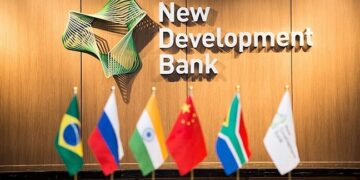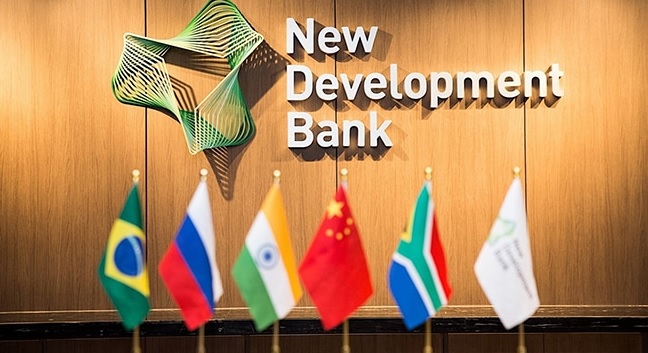By John Ikani
The New Development Bank (NDB), established by the BRICS nations, concluded the auction for its inaugural South African rand bonds on Tuesday, August 16th, amid mounting pressure to bolster its fundraising and lending in local currency.
The NDB’s initial bonds, including a five-year note worth R1 billion ($52.3 million) and a three-year note worth R500 million, collectively garnered R2.67 billion in bids, according to auction results shared by two investors.
The development comes weeks after the Finance Minister of South Africa expressed concern ahead of the upcoming Brics summit in Johannesburg, stating that the NDB, created to empower Brics members (Brazil, Russia, India, China, and South Africa) with greater control over development financing, was not sufficiently engaged in lending in local currencies.
Leslie Maasdorp, the Chief Financial Officer, highlighted the bank’s intent to elevate local currency lending, which has primarily been centered on the Chinese yuan, from its current level of about 22% to 30% by 2026.
However, Maasdorp acknowledged that there are limitations to the process of reducing reliance on the US dollar.
The South African bond market has faced challenges in attracting new issuers in recent years to match the rising demand from domestic investors seeking reliable credit assets.
NDB’s three-year rand bond was priced at a floating rate of 95 basis points (bps) above the three-month Johannesburg Interbank Average Rate (Jibar), while the five-year bond was set at Jibar +105 bps.
Raphi Rootshtain, a portfolio manager at Sasfin Wealth, pointed out that comparable South African government bonds were a 4.5-year bond priced at Jibar +90 bps and a seven-year bond priced at Jibar +120 bps.
He remarked, “It is interesting to note that most of the underlying lending activities in South Africa are to State-Owned Companies (SOEs). Therefore, the NDB will essentially emerge as the fresh proxy funding platform for SOEs, carrying additional associated risks.”
Standard Bank, the arranger of the bond sale, and Absa Bank, both declined to comment on the matter.
Kumeshen Naidoo, the head of debt capital markets at Absa, commented on the sale, stating, “The sale witnessed approximately 94% of bids aligning with or falling below the price guidance, with the issuance rates achieving the narrowest spreads recorded by a non-government issuer in 2023.”



































